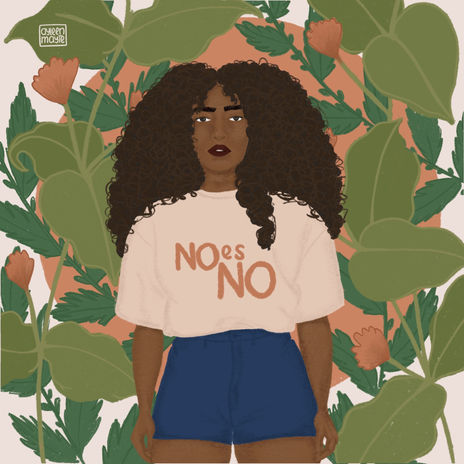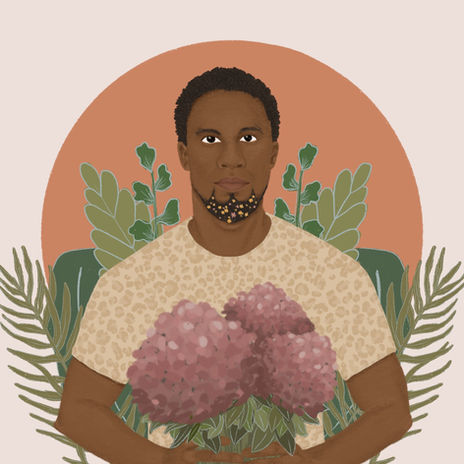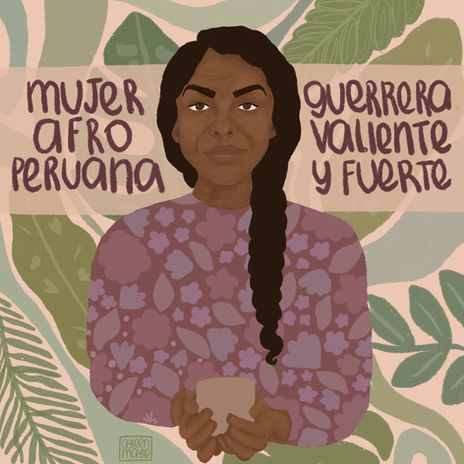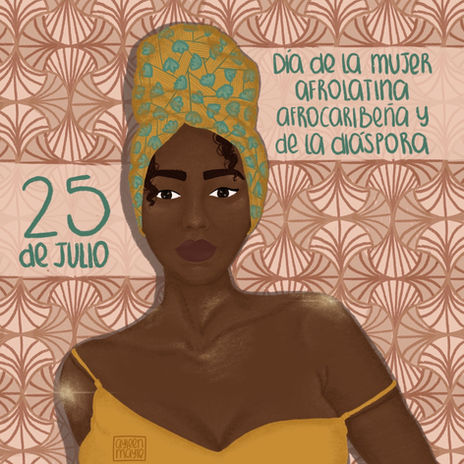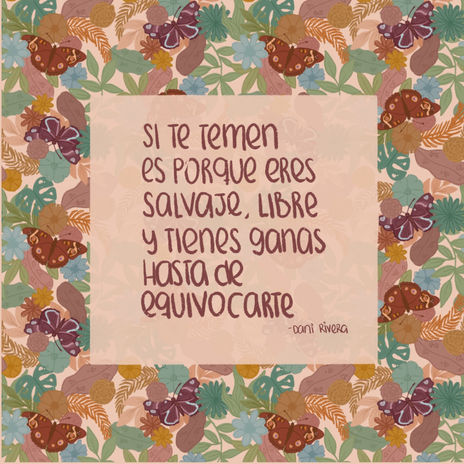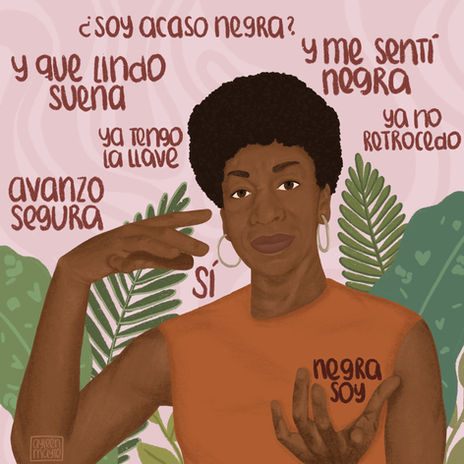
Use your voice without fear
An Interview with Ayleen Mayte by Xime Izquierdo Ugaz
Ayleen Mayte is a prolific self-taught illustrator and muralist based in Lima, Perú, who uses paint and digital drawings to create beautiful landscapes where Black women thrive and find themselves and each other. Her worlds embody her very Taurus feels of beauty and comfort and coming to terms with knowing that we deserve those things. In the past few years, she’s grown a lively community around her work, as she often uses her creations to empower women and discuss topics ailing her community. She’s also dedicated to collaborating with other women, especially other Black creatives, entrepreneurs, and scholars, to continue using her art to disseminate information and education. On Mondays, she has her “La Tiendecita” an online pop-up shop on her Instagram stories, which allows her to sell her prints, agendas, calendars. We had a chance to catch up over these past few months.
Xime Izquierdo Ugaz: How do you define Ayleen? Tell us a little about who she is and what she's most passionate about.
Ayleen Mayte: A person in constant learning, I feel that I am in a period in which I do not stop learning. I feel that everything that happens to me and all the people who pass through my life teach me so much—I am very grateful for that. I think that now I am also freer and more secure—I owe that to illustration and the people it brings me to. I am passionate about my work—doing what I do today has completely changed my life and my perspective. I like to be able to imagine a drawing and make it come true (and at the same time give a message with it). At least I hope I am achieving that.
Xime Izquierdo Ugaz: You are definitely transmitting a lot of important messages! What is the most significant thing you have learned in recent years? How did it change you?
Ayleen Mayte: That this path of self-love that I started hand-in-hand with illustration will never end. That there is no end in which you say, “Done! I love myself completely, and I will never doubt myself again.” That is not going to happen—I will have good and bad days for the rest of my life. I will still feel bad for some part of me at some point. And this has changed me because now I am more flexible with myself, I am more permissive with my emotions, I do not criticize myself so much, and I am freer to let myself feel and be the person I want to be.
Xime Izquierdo Ugaz: I deeply resonate with that! Art sometimes helps us create a space for meditative practice. When I see your work, that feels very present. What led you to start painting these messages?
Ayleen Mayte: I think mainly my experience—what I was living at that time. I started illustrating curly-haired women because I was in the middle of my transition—I wanted to get my curls back and I needed to see more women wearing and embracing their natural hair to make my transition process more bearable.
Returning to my natural hair—respecting and loving it as it is—was my first step towards self-love. I think that is why almost all my illustrations are about this eternal process of body acceptance, and all the emotions and frustrations that maybe you can feel while you're living it.
Xime Izquierdo Ugaz: Do you remember the first time you saw a work of art and felt represented?
Ayleen Mayte: Oh, I don't know. In my own work, I think? But I didn't know or follow many artists before, so that's perhaps why I couldn’t find myself.
The curly and Afro-Peruvian community is growing and needing more visibility. It is demanding the representation that it should have always had.
Xime Izquierdo Ugaz: Have you seen any change recently in terms of visibility and Afro-Peruvian representation in the artistic field? What do you think is the impact of this, and how do you see your part in it?
Ayleen Mayte: Yes, I want to say that I have felt it. More people are raising their voice for their rights, demanding respect, and denouncing racist and discriminatory acts. There are also more people informing and educating about Afro-Peruvian culture. I believe that all this helps with visibility and gives Afro-descendant people the representation we deserve and brings recognition to our contribution and value in Peru. I want to believe that my work is a small window of representation for Afro-Peruvian women—so that they see themselves reflected, so that they are stronger and more confident, so that they can accept and feel proud of their beauty.
Xime Izquierdo Ugaz: Many years ago, I had a professor named Christina Sharpe who said something that marked me a lot: "Representation is not freedom." Do you think this applies when speaking of representation in Peru?
Ayleen Mayte: I believe that representation can give the drive, tools, and confidence to be how you want or who you want to be. For example, the visibility of Afro-descendant people in positions of power or success (or the mere fact of seeing more Black people in media) can help break down stereotypes and lift the negative burden placed on Black culture.
Seeing yourself reflected in another Black person you admire can show that you can also achieve; that society will hinder you but that it is also changing—that we are changing it. I believe that we must continue learning and teaching—we must not tire of repeating things, we must not stop talking and recounting experiences, we must continue looking for spaces where the Black community can be represented. And above all, we must support people who create these spaces—those who speak and say things without fear, those who have fought, and made an effort so that our community is recognized and valued.
Xime Izquierdo Ugaz: Tell us a little about the elements of your work. Behind, beside, and sometimes on top of the bodies of Black and curly-haired women, there is often the presence of fauna and flora. What relationship do you see between all these elements, and how are they forged in your imagination?
Ayleen Mayte: I think the plant thing started with my idea of returning to my “natural” hair and the natural, free, and authentic beauty of each woman. I felt that plants and flowers were an element with which I could represent each woman's natural beauty.
And the animals, I think they started to show stronger in my illustrations at the end of last year when I began creating my 2020 calendar “Salvaje.” “Wild” for me means free, strong, and confident, and the animals that I draw represent that to me. They are strong, elegant, powerful animals—just like us when we accept ourselves and recognize the value and power that we have.
Xime Izquierdo Ugaz: In what ways has the use of digital tools changed your work? And how important has it been to have the presence of your work and your messages on social media?
Ayleen Mayte: Social media is fundamental for me. Almost all the exhibitions of my illustrations are through social media. It helps me have a more direct connection with the people who like my work. I can show a bit of my day-to-day—the good and not so good things that happen to me, my processes, and my doubts. Thanks to social media, I have met people from the Afro-Peruvian community who have taught me so much—there is so much knowledge to share. I have also formed a small community—people who follow me and comment on my work or the things I share. Some tell me about their fears or frustrations and we talk as friends. I want to believe that the relationship between the person who buys or likes my work is a little more real and close—that it does not necessarily end with the purchase. It gives us the opportunity to keep in touch, and that is nice.
Xime Izquierdo Ugaz: What kind of impact have you seen your art have on your community?
Ayleen Mayte: The most beautiful thing that happens to me is when someone writes to tell me that they feel reflected in one of my illustrations, or that the image I shared was just what they needed at that moment—that it helps them in some way. I think that their feeling represented is the best impact my art can have on people.
Xime Izquierdo Ugaz: What is the Colectivo Papaya (Papaya Collective) and how was it formed?
Ayleen Mayte: Colectivo Papaya is a group of four self-taught female artists, with many fears and doubts, but also great ideas and eagerness to be able to change things and create opportunities for girls and women.
We have been together for almost a year and a half. We met at a mural painting session. We painted at a school (thanks to the organization of Arte y Alma), and we got along well. We liked each others' styles—we had the same desires, frustrations, and ideas. The four of us wanted to do something else with our work, so we got together to create Colectivo Papaya.
It is not so easy to be able to organize between the four of us. Sometimes our time and other responsibilities beat us. Still, we continue with the intention of creating something beautiful that helps girls and women to believe in their talent and their power.
Xime Izquierdo Ugaz: I imagine it has been important for you to have a group of other women artists who support and build together. What is your ideal space to create? What do you hear, read, and surround yourself with when you draw?
Ayleen Mayte: It's the best thing that ever happened to me. They are my art friends, who, like me, are independent. They have to take great risks. They always want and have to be creating and learning. We almost always have the same difficulties and doubts, risking, and trying something new. For example, releasing a new product can be very scary—not knowing if people will be into it, if they will buy it, if it will have been worth the effort. To have someone with whom to share those moments, or ask for advice, is one of the best supports I can have.
Now I work from home, I have a mini-workshop in my room, but I quite like working there. I have my little plants, my illustrations—it's fresh, and almost always my dog is keeping me company. When I am very stressed, or something does not come out as I imagined it, I prefer to be without music. Other times I almost always listen to music to cry to—super emotional music that I know the lyrics to that I can sing out loud. Something that always happens is that if I'm at home and it's noon, my mom turns on her radio to listen to musica criolla. I like it; it has helped me create several times.
Xime Izquierdo Ugaz: How beautiful. Music can help so much with focusing and creating. What do you think it is about musica criolla, specifically, that has helped you create?
Ayleen Mayte: I think that it is the rhythm—the sounds of each instrument, as well as the emotion and passion with which they sing it. I feel that it connects me with something ancient or ancestral that I carry deep within me. For as long as I can remember, every time I listen to this music, I feel like it activates my heart—it makes me happier with more desire to do things. It also makes me want to dance, and sometimes I get distracted from work, but it always puts me in a good mood.
Xime Izquierdo Ugaz: What dreams do you have for your art? How would you like to see it grow, expand?
Ayleen Mayte: One of my goals is to be able to have a virtual store and to be able to send my things outside of Peru. Several times people have written to me from other countries because they want some of my illustrations or products, and to reach another country would be incredible. I want to be able to participate in an illustrator fair outside of Peru as well.
Xime Izquierdo Ugaz: How have you been taking care of yourself during this difficult year? How has it impacted your artistic processes?
Ayleen Mayte: This year has been complicated. In the beginning, when the quarantine began, it was super difficult. I had some projects about to come out, some murals to paint, and I was going to make t-shirts to sell, and all that fell through—in addition to everything we are living and experiencing. Economically, everything stopped for me, and everything was adding up and making it more difficult for me emotionally.
But as time went by, I adapted. I was trying to see and create opportunities within my possibilities. I started drawing more, concentrating more on my work, illustrating what I felt, without pressure.
Now I try to be more in contact, virtually at least, with the people that are important to me. I try not to pressure myself, to give myself my moments to feel and accept the good and bad days. I always think of the beautiful things that have happened to me, and how I have progressed with my work, and I am grateful. Being grateful always helps.
Xime Izquierdo Ugaz: What opportunities lie ahead? Do you have a new project coming up?
Ayleen Mayte: Days before the quarantine began, we inaugurated a collective exhibition with the Papayas in Barrio Jockey, called “Coraje.” It is about the desire that we all have not to give up and continue fighting, despite the obstacles, despite the people who do not believe in you. The show is still going—we are a bit sad that there are not many people who can go see it—but we hope it stays up for a while.
I am also very excited to release some new products. I just launched my ergonomic mouse pads, and I am finishing planning two more new products, but they are a surprise. I am already against time to start preparing my end of the year collection. Within this collection I will have 2021 calendars, notebooks, planners, notepads, and I am thinking of two more products. So I think that these upcoming projects will keep me very entertained for the remainder of the year.
Xime Izquierdo Ugaz: If you could send a message to Ayleen, the girl just beginning to understand herself in this world, this country, what would you say?
Ayleen Mayte: To be stronger, to not doubt herself so much. That she has the power to change the situations that she does not like, the spaces that make her uncomfortable. She only has to trust that internal fire that she has. That she doesn't have to fit in, she doesn't have to be the same as the others; she doesn't have to be liked by everyone. Finally, to not remain silent about anything, always speak and use her voice without fear.
Ayleen Mayte is an interior architect by profession, illustrator by heart and out of love. She started in illustration in approximately 2017 and her work has evolved hand in hand with the process of recognition, acceptance, and love. Her illustrations mostly reflect her own process, emotions, fears, frustrations, experiences, and joys.
Xime Izquierdo Ugaz is a South American non-binary multimedia artist/writer, curator, language justice worker, and educator. They're currently based in Lima and live with their cat Ocean. They are the visual arts co-curator at Nat. Brut, co-organizer of QTPOC festival based in Peru, Cabritas Resistiendo as well as BODYHACK, a mutual aid global party by and for trans & nb folks. Their first chapbook is titled Estoy Tristeza (No, Dear Magazine & Small Anchor Press, 2018).


